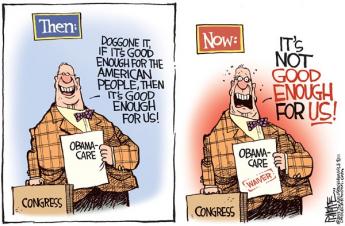Related Topics
Insurance in Philadelphia
Early Philadelphia took a lead in insurance innovation. Some ideas, like life insurance, flourished. Others have faded.
Dislocations: Financial and Fundamental
The crash of 2007 was more than a bank panic. Thirty years of excessive borrowing had reached a point where something was certain to topple it. Alan Greenspan deplored "irrational exuberance" in 1996, but only in 2007 did everybody try to get out the door at the same time. The crash announced the switch to deleveraging, it did not cause it.
Right Angle Club: 2013
Reflections about the 91st year of the Club's existence. Delivered for the annual President's dinner at The Philadelphia Club, January 17, 2014.
George Ross Fisher, scribe.
Medical Economics (2)
New topic 2013-04-09 21:37:40 description
Higher-cost Health Insurance is What's Mandatory

|
| Obamacare |
Millions of people were unexpectedly canceled by health insurers at the onset of the Obama Insurance Exchanges. The President repeatedly told the public under Obamacare they could keep their old plans if they wished, even after notices to the contrary were mailed out. Insurance spokesmen firmly responded that the terms of the law required they could not keep the old plans for a single day. This promise was reinforced by the original section 1251 but later amended in confusing ways. The public had been told nothing like that during a three-year opportunity to be open about it; in their view, it was sprung on them. Maybe they had even been lied to; more likely, someone objected, causing revision that could be interpreted in several ways. In any event, postponement of the large-employer plans made it moot for the customer but not for the voters. To quell the uproar, the President quickly delayed the cancellations for a year, then extended the suspension, and soon provoking alarmed announcements from the insurance industry that such insurance would lose money. It suddenly became a question whether he could make the insurance companies take them back, and some said they wouldn't, even for just one year. It all sounds like an uproar on the other side of the curtain. The irresistible conclusion emerges there is more to this arrangement than is revealed, with further surprises to be feared. After all, the old rates had been set by the insurers, so something extra must have been added by someone else, but possibly it triggered some clause in the risk corridor provisions. Long accustomed to caveat emptor from salesmen, the public will have trouble getting over the assumption that insurers had been promised more expensive products to sell, in return for doing something of value for the Obama administration we haven't yet learned about.
In a world long accustomed to government anti-trust constraints, that higher prices with less competition could be mandated by law was almost too good for insurance companies to imagine. But now, after the deal is suddenly "postponed", any other industry groups who may have negotiated secret accords, are warned of the price: they must expect to absorb some costs whenever this President is forced to abandon his side of a bargain. The National Journal recently quoted an interview with an insurance lobbyist that large amounts of insurance money helped finance Tea Party meetings, suggesting internal dissension within the industry.
In any event, the canceled policies were almost entirely individual policies in the end, and the ultimate goal is speculative. A different way of expressing the thought is, a large collection of individual policies can more easily resist pressures to cross-subsidize other favored clients. One thing is almost uniformly true of persons who hold individual (as opposed to group) policies: they pay for health coverage with after-tax dollars and therefore are out of pocket by 20-30% extra for equivalent insurance. Many of them may well resist higher-priced products for that reason. Eliminating individual policies would cost the government considerable tax money and indirectly raise premiums. There must be some other motive for animosity toward individual policies, but we will have to wait to find out what it is. It may be just as simple as reducing the visible cost gap between the old system and a new one.
Originally published: Saturday, November 16, 2013; most-recently modified: Sunday, July 21, 2019